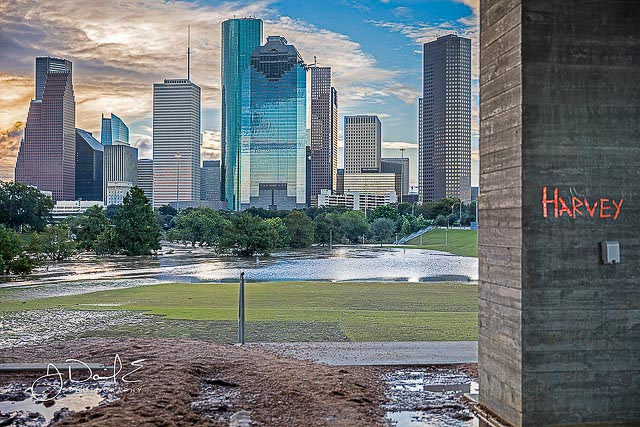When it comes to managing risk, explained Ron Eguchi, president and CEO of risk and disaster management company ImageCat, "We are in the best of times, but we are in the worst of times." Part of a recent conference hosted by insurance company Lloyd's of London on resiliency and disaster preparedness, Eguchi added, "Best of times because we have great technology, but worst of times because people are overwhelmed with the possible threats."
From market crashes to floods and earthquakes, cities are vulnerable to a number of risks and the best resiliency planning takes the many possibilities into account. Panels of speakers from the insurance industry, government sectors and educators gathered together on Rice University's campus recently to speak on how Houston and other cities can better prepare themselves for disasters, both natural and man-made.
President of Lloyd's North America Hank Watkins highlighted a global report published by the company and University of Cambridge researchers called the Lloyd's City Risk Index, which shows the probable threats to a city's GDP. Houston's largest economic threat is flooding - though this isn't typical. The biggest threat to most cities is a potential market crash.
Keeping with that pattern, market crash is the costliest threat to all of the top 10 cities with the highest estimated risk in North America aside from Los Angeles and Houston—earthquakes and floods are the highest risks for those two cities respectively. Overall, Houston is the fourth North American city with the highest GDP risk at a loss of $4.95 billion, according to the report. New York, Los Angeles and Chicago outrank Houston as the top cities at risk.
During the presentation of the index report, Watkins said, "While no city can be completely risk-free, pro-active risk management can minimize the impact of threats to individuals." He, among other speakers, encouraged the importance of resiliency in natural and man-made disasters.
While the biggest nod was—perhaps not unsurprisingly given the conference's host—to having appropriate insurance coverage to increase resiliency, others encouraged a diversified outlook to how Houston can be more resilient.
Some of the suggestions included updating communications like creating text alerts that go directly to citizens, varying technologies employed during and after a disaster, like using drones and robots to go into affected areas to analyze the damage and get claim money to residents quicker, and managing growth in an ever-expanding city without putting people in danger. A big way to keep people safe, according to critics, don't let them live in floodplains—something Houston has failed to effectively curb even after Harvey.
Kent Sullivan, the insurance commissioner of Texas, noted, "Government needs to be a partner, not a barrier, towards innovation and resiliency. When you think of government, you think of outdated operations. The government can't run on an Excel spreadsheet when the rest of the world is running on a Tableau spreadsheet."

